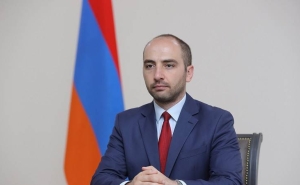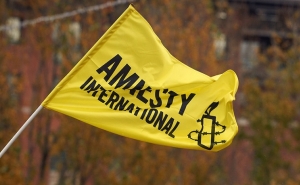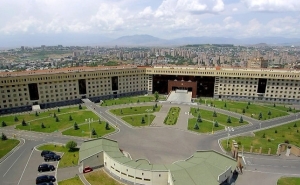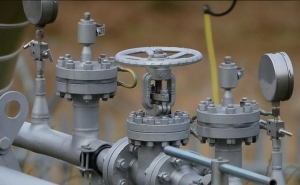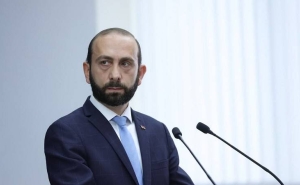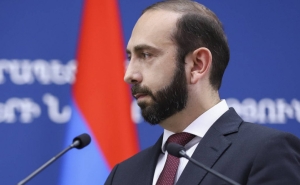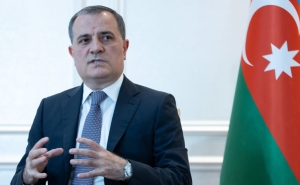 Georgia's "Gas" Game: What Gained Tbilisi?
Georgia's "Gas" Game: What Gained Tbilisi?

Over the past few months possible alternatives for the energy supply of Georgia was being actively discussed. This started in the fall of last year, when the Georgian Energy and Natural Resources Minister Kakha Kaladze declared that Georgia's gas consumption since 2010 has increased by about two times, and the volume of gas supplies at present does not satisfy the growing demand of Tbilisi. After such a statement the Georgian side with different intervals began consultations and negotiations simultaneously with 3 sides - with the Azerbaijani SOCAR to possibly increase the volume of gas supplies, Russian "Gazprom" and with the National Iranian Gas Export Company (NIGC) to start deliveries.
Kaladze regularly voices about progress in the negotiations. As for the moods in the Georgian society, it should be noted that if the negotiations between the Azerbaijani (despite the gas supply monopoly) and the Iranian sides were perceived positively, the talks with the Russian "Gazprom" have caused some discontent. We cannot rule out that the Azerbaijani lobbyists in Georgia, as well as some of the interested parties have also done essential work on this issue.
It is noteworthy that during the gas talks, a number of interesting statements by the parties were made, for example, ""Gazprom" is ready to provide Georgia with gas with less price than the Azerbaijani gas", "Iran and Georgia have reached an agreement on the the supply of 500 million m3 of Iranian gas per year, which is the basis for longer-term cooperation"," Because of some technical problems SOCAR cannot increase the supply of Azerbaijani gas," etc.
All these statements brought great reactions both in Georgia and in the whole region. Georgia is playing an interesting "gas" game, the results of which became clear in early March.
On March 4 Georgian Energy Minister Kakha Kaladze and the head of Azerbaijani SOCAR head Rovnag Abdullayev signed a new revised version of the Georgian-Azerbaijani 2011 agreement on gas supplies. The new agreement presupposes that Georgia will receive from Azerbaijan an additional 463 million m3 of gas from "Shah-Deniz" pipeline.
Today Georgia receives Azerbaijani gas from two pipelines. In the framework of 2015 agreement on South Caucasus pipeline Georgia received 712 million m3 of gas from Shah Deniz, and 1.48 billion m3 of gas in the framework of another agreement with SOCAR.
As for the problems hindering the increase of supply raised several times by Kaladze, these, according to the Georgian Minister, have been regulated with the efforts of the Azerbaijani side. How Azerbaijan, facing serious economic problems managed to solve the technical problems requiring significant financial investment in such a short period of time, is not clear. It is also noteworthy that the Georgian Minister said that Georgia no longer needs to search for alternative sources of gas supply.
Given the statements during gas talks, as well as not so rational outcome like the "gas" game, we can assert that during the final decision-making process political factors, including the impact of different leverages have also had their influence.
How can such a contract be estimated for its sides - Azerbaijan and Georgia. The contract allowed Azerbaijan to maintain and even increase its monopoly in the Georgian gas market. Naturally, this also means strengthening its leverage on the domestic and foreign political processes in Georgia.
As for Georgia, due to the real increase in the supply of gas, Tbilisi will be able to close its deficit. Moreover, through the same "gas" game Georgia managed to "force" Azerbaijan make concessions: in gas stations, gas prices will fall by 35-40 dollars for 1000 m3.
In addition, the parties have agreed on the reduction of the price of gas consumption (it is not known how much). It is noteworthy that this concession does not refer to the whole imported gas to Georgia - a factor that many do not pay attention. Price reduction will only refer to the so-called "social gas", which is about 500 million m 3 (until now $ 189). At the same time Georgia lost its real opportunity for diversification of gas supplies by strengthening the monopoly of SOCAR with its possible consequences.
As for Armenia, it should be noted that the "losing" moods among the Armenian society because of Georgian-Azeri gas deal was not adequate. In fact, the new contract does not imply any material change, the only problem is the feeling of not being satisfied because of Armenia’s exaggerated expectations and haste. As for the prospect of becoming a possible transit country for the Iranian gas, there is no doubt that this prospect will stay long on the regional agenda, but for its realization a right moment and intersection of interests of various parties are needed.
-
 17:08
17:08The regular session of the Anti-corruption Policy Council takes place in Jermuk
-
 15:05
15:05The Prime Minister sends congratulatory messages to the supreme leader of Iran and the President of Iran
-
 11:11
11:11Armenia sends earthquake aid to Turkey
-
 10:43
10:43Commemoration of the Pontiff St. Sahak Partev
-
 09:16
09:16Some roads are closed and difficult to pass in Armenia
-
 19:55
19:55Phone conversation of the Foreign Minister of Armenia with the U.S. Assistant Secretary of State for European and Eurasian Affairs
-
 18:30
18:30Prime Minister Pashinyan and President Khachaturyan meet
-
 18:20
18:20Ararat Mirzoyan with Co-Chairman of the OSCE Minsk Group of France Brice Roquefeuil
-
 17:01
17:01Humans could land on Mars within 10 years, Musk predicts
-
 16:45
16:45France, US urge 'immediate' end to Nagorno Karabakh blockade
-
 16:01
16:01Blockaded Nagorno Karabakh launches fundraiser to support quake-hit Syria
-
 15:59
15:59Earthquake death toll in Turkey rises to 18,342
-
 15:43
15:43Ararat Mirzoyan Held a Telephone Conversation with Sergey Lavrov
-
 15:06
15:06French president rules out fighter jet supplies to Ukraine in near future
-
 14:47
14:475 Day Weather Forecast in Armenia
-
 14:44
14:44President Vahagn Khachaturyan wrote a note in the book of condolences opened in the Embassy of Syria in Armenia
-
 14:20
14:20Azerbaijan’s provocations impede establishment of peace and stability – Armenian FM tells Russian Co-Chair of OSCE MG
-
 12:57
12:57France representation to OSCE: Paris calls on Azerbaijan to restore freedom of movement through Lachin corridor
-
 11:40
11:40Command of Kosovo forces highly appreciated preparation of Armenian peacekeepers
-
 10:16
10:16The United States withdrew from sanctions against Syria for six months the provision of assistance after the earthquake
day
week
month
Humidity: %
Wind: km/h



